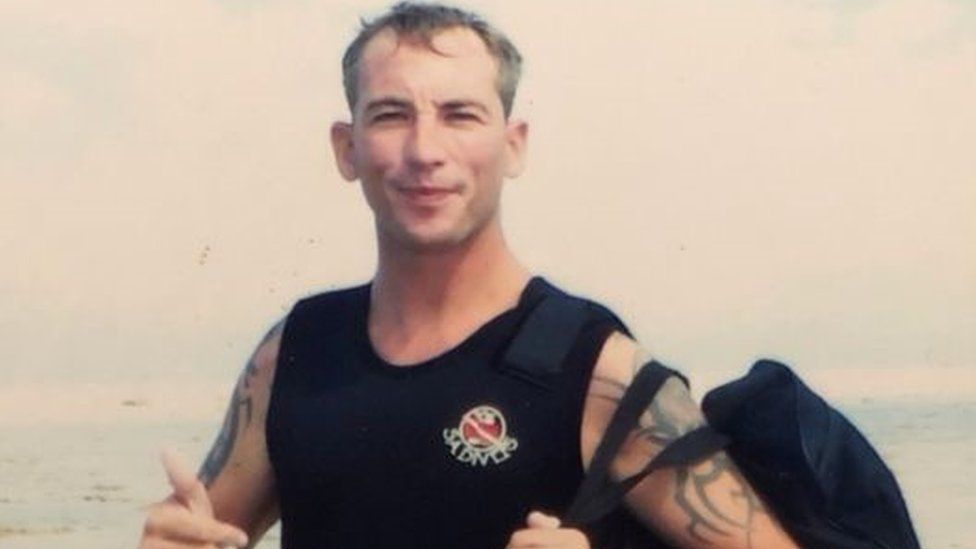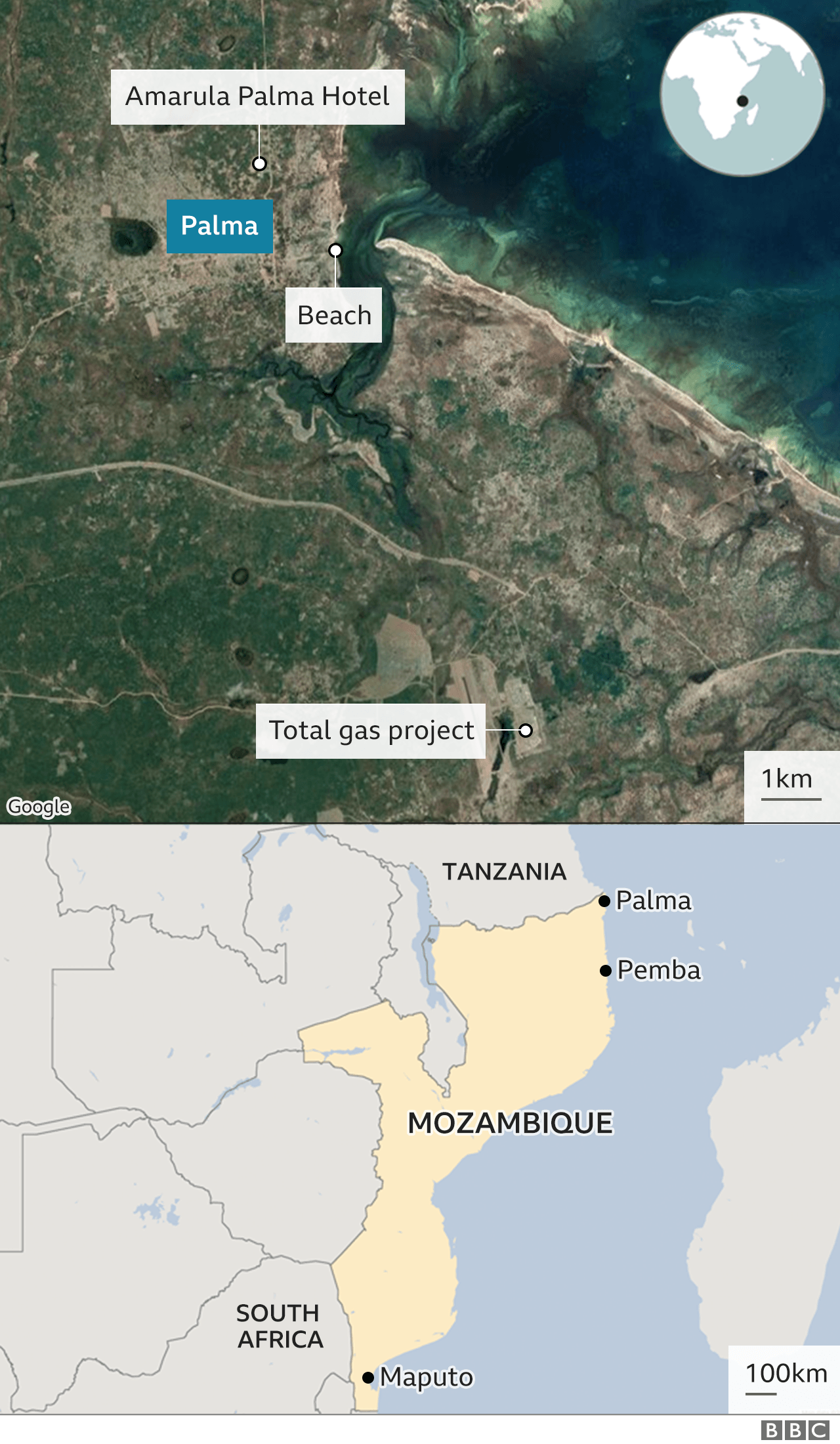South African Adrian Nel killed in Mozambique jihadist attack
- Get link
- X
- Other Apps
 IMAGE COPYRIGHTMERYL KNOX
IMAGE COPYRIGHTMERYL KNOXSouth African Adrian Nel is one of the victims of a brutal insurgency being waged by militant Islamists in northern Mozambique. Dozens of bodies have been seen but few details have emerged about the other casualties.
Mr Nel would have celebrated his 41st birthday on 1 April.
But his body now lies in a mortuary in Pemba - a coastal city in Mozambique's resource-rich Cabo Delgado province.
The region has become the latest front line in the global war being waged by militant Islamists.
On Wednesday, hundreds of those militants stormed the town of Palma.
Mr Nel was among dozens of people who were trying to flee the attack. His body was recovered by fleeing survivors - including his father and younger brother.
Speaking to the BBC from her home in South Africa, Nel's mother, Meryl Knox, said her son leaves behind his French-Canadian wife and three children - a 10-year-old boy, and two girls, aged six and two.
"He was an absolutely beautiful father, and a beautiful person all round," she said.
"There's been so many messages of comfort from people that have known him throughout the years. And he will be terribly, terribly missed."
Mr Nel was a commercial diver who had lost his job in South Africa because of the devastating impact of Covid-19.
He moved to Mozambique in January to join his father and younger brother in the construction industry, building workers' accommodation camps in Palma, which has become the hub of a burgeoning gas industry following the offshore discovery of one of the largest natural gas fields in Africa.
A mere three months later, he faced a cruel death, having been shot by militants who had carried out a four-day assault on the town, targeting shops, banks, a military barracks and the Amarula Hotel, where Nel, his father and younger brother had taken refuge along with other expatriates.
What's the latest from Palma?
In a BBC interview, South African private security firm Dyck Advisory Group, which has been hired by the Mozambican government to fight the insurgents, said the militants were still in control of Palma on Monday.
"My guys are engaging these terrorists in skirmishes. The terrorists have taken cover in houses, which is what they always do. They come out and shoot at the aircraft, and they have hit and shot at our aircraft often," the firm's CEO Lionel Dyck said.
He added that the militants currently held the initiative.
"Until we put sufficient troops in there to clear them out of the houses of Palma they will remain in control," Mr Dyck said.
An IS propaganda outlet published a photo on Monday, supposedly of a group of fighters from its Mozambican branch in Palma as it claimed responsibility for the attack.
IS alleged that 55 people - including Mozambican soldiers and foreign nationals - had been killed in the assault on the town but this has not been independently verified.
However, unnamed Mozambican government sources quoted by the state news agency said the insurgents had been driven out of Palma, and they were fleeing towards the Rovuma river, bordering Tanzania.
'Attackers mingled with civilians'
Mrs Knox said details around her son's death were still sketchy, but he appeared to have been killed while trying to escape on Friday.
"No army to protect them, none of them having weapons, so it was a matter of run for your life or face these insurgents, who are so cruel and barbaric," she added.

You may also be interested in:

Hundreds of heavily armed militants raided Palma, leaving dozens of people dead. They included Mr Nel and six others who were in a convoy of vehicles that was apparently ambushed.
In an interview with Reuters news agency, Mrs Knox said her husband, Gregory, and younger son, Wesley, hid with his body in a bush until the next morning, when they went to Pemba, about 250km (155 miles) south of Palma.
Adriano Nuvunga, director of the Centre for Democracy and Development in the capital, Maputo, told the BBC's Newsday programme that it was a clear failure of intelligence - and a disaster for the government as it tries to encourage foreign firms to invest in the area.
"The indications we have is that the violent extremists were coming in one-by-one with bags and weapons in their backpacks... They've been attacking from within, which I think was difficult to control, as they were mingled with civilians and local communities."
'Where was the help?'
One contractor told the BBC that the rescue operation to Pemba was carried out by local companies and suppliers.
"In the wee hours they managed to co-ordinate and reach out to the evacuees on the beach and got them on to boats and got them into safety."
"Where the hell was the support from big companies, from countries?" he asked.
Mrs Knox was scathing about the South African government's response to the attack.
"There wasn't any support from our government until we phoned them and asked them what's happening and why isn't anybody helping people stranded there," she told the BBC.
Mrs Knox said she had spoken to her husband, who was still in Mozambique with their youngest son.
"The doctor did go and see them last night and at least they got some sleep. But I hear Wesley's not doing very well," Mrs Knox said, without going into details.
AFP news agency reports that Wesley will be evacuated to South Africa on the first available flight, while Mrs Knox's husband will remain in Mozambique until their late son's body is repatriated.
"Adrian was just such a shining light - somebody who kept the family together with his constant joy and love. Now [we've got] to try and pick up the pieces and just hope we do well with his wife and his children," Mrs Knox told the BBC.

Related Topics
- Published
- 13 March
- Published
- 8 hours ago
Comments
Post a Comment